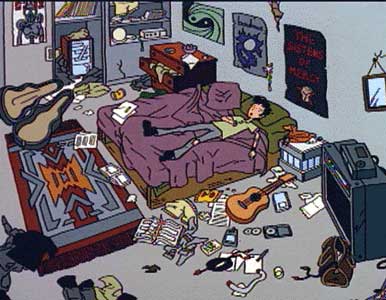
I, completely and totally and irrevocably, heart
Randall Munroe. Randall is just this guy who, in his spare time, climbs things, opens strange doors, and goes to goth clubs dressed as a frat guy so he can stand around and look terribly uncomfortable (at frat parties he does the same thing, but the other way around). His favorite astronomical entity are the
Pleiades, and oh, he also draws this
webcomic of romance, sarcasm, math, and language full-time, supporting himself from merchandise sale (so go
buy something already). Which is all for the best, if you ask me, because I cannot - and indeed do not - want to imagine a life without a regular dose of xkcd to keep me grounded, happy, and sane. Actually, I don't know that there is anything I could write about it here that could possibly add to its appeal. I mean, its a no-brainer; if you already count yourself among its legions of fiercely dedicated fans then I would just be preaching to a very passionate choir, and, if you are unaware of it (because, come on, if you were
aware of it then you would be in the former group, duh) then I actually envy you because now you would have the chance to blow your world by experiencing the awesomeness that xkcd is for the very first time.
So what is it that brought me out of years of blogging hibernation? Well, just when I thought that things couldn't get any better, I find out that the comics (all of them) have
mouseover text! How cool is that!! (Alright, you don't have to tell me that all of you knew this already, and, like always, I am once again the last one to find out.) But look at the silver lining though, now I get to go back and enjoy my favorite ones all over again, and finally get answers to some of life's persistent questions that I have always had about a few of the strips. It's almost like finding a previously unknown
Easter egg in a dearly beloved DVD. Or the Universe turning from black and white to color while you were asleep. You know, one of those.
Some of my favorite xkcd strips, in no particular order:Students (I still have this dream all the time.)
TED talk (I stay awake nights thinking about this problem.)
Angular Momentum (This is perfect - It appeals almost equally to the science nerd as well as the romantic in me.)
Useless (I did major in Statistics, after all.)
Dream Girl (This one still makes me cry every time I look at it...)
Update: And now, the xkcd book! Also, on a dissenting note,
here is someone who thinks that xkcd sucks.









